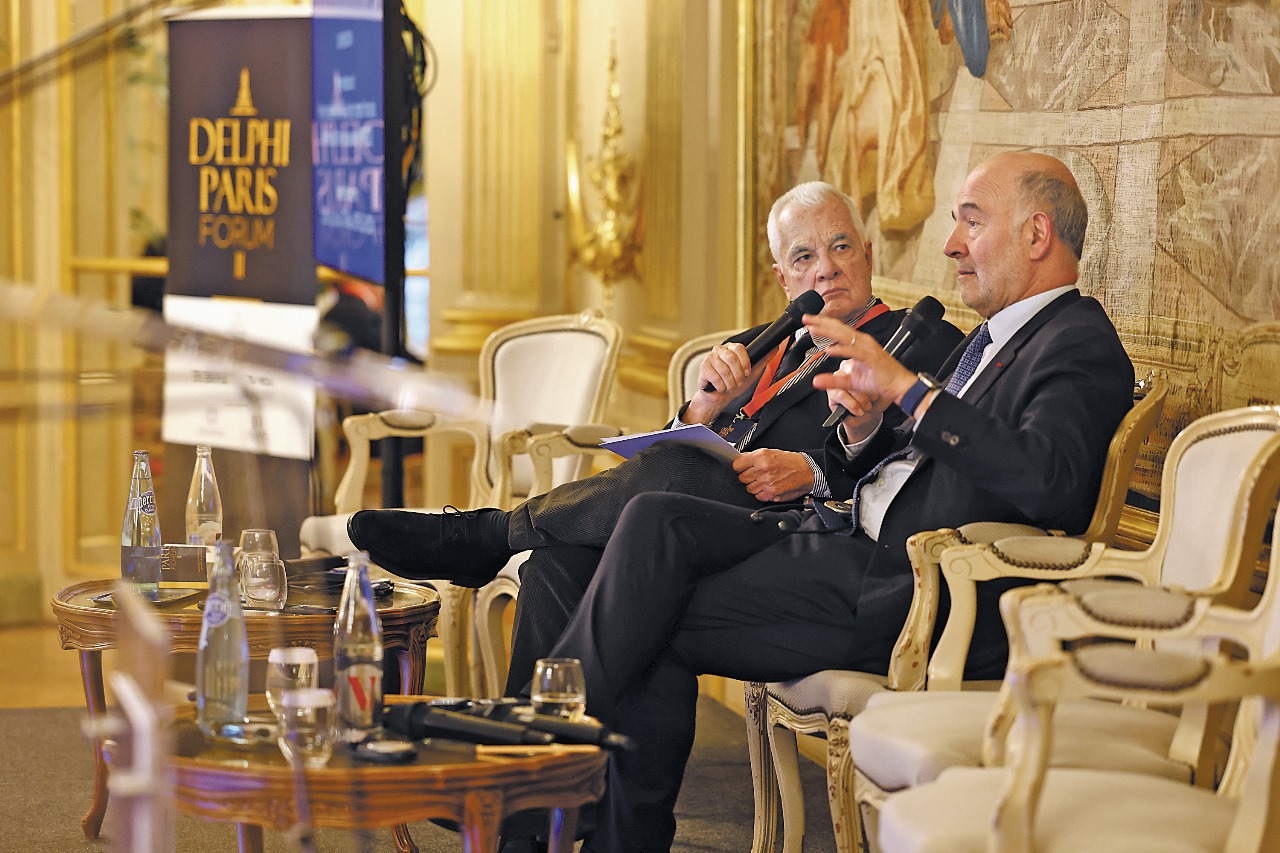“I got on well with all the Greek prime ministers. Including Alexis Tsipras, who was smart, skilful and flexible. He wasn’t ready at the start, but he learned…”. In his speech at the Delphi Paris Forum II, staged in the French capital by To Vima, Ta Nea and the Delphi Economic Forum, the President of the French Cour des comptes and former Finance Commissioner Pierre Moscovici had a great deal to say. And he covered everything: the SYRIZA government, the new Trump era in the U.S., the challenges facing the European Union today and–of course–Greek-French relations up to the present.
In discussion with the publisher of To Vima newspaper, Yannis Pretenteris, Mr Moscovici referred to the role played by the 2015 referendum, saying: “Paradoxically, the referendum helped Tsipras get re-elected and perform the necessary “somersault” on the agreement with the creditors. Euclid Tsakalotos was a fine partner, while Prespes revealed Tsipras’ boldness, even though it cost him politically.”
He went on to describe the first months of Tsipras’ government as being “difficult” due to Yannis Varoufakis. “I read Mr Varoufakis’ book and he is lying,” he said, noting that the then Greek Finance Minister’s aggressive stance caused problems in meetings. Speaking on the Greek crisis, Mr Moscovici referred to the crucial role France and the European Commission played in keeping Greece in the euro: “We said no to Grexit, along with our Italian friends. Schäuble was in favor of Greece leaving the euro, but we French are philhellenes and we wanted Greece to stay.”
Referring to the international news, he described the Trump presidency as “dystopian”, stressing that the new U.S. president “is not a friend of liberal democracy. He will implement an anti-immigration policy, and he’s both a climate change skeptic and an isolationist. We must be ready to respond to his policies with unity, not division.” He added that “I’m not in favor of taking an aggressive stance, but we must not be naïve.”
The geopolitical challenges
The former Commissioner also spoke at length about the geopolitical challenges facing the European Union today, with a particular emphasis on Ukraine: “The future of Europe depends on Ukraine. Kiev must not lose and we must remain at Ukraine’s side to the last. We must have a common strategy and make no concessions.” He does, however, believe that Donald Trump could impose a solution on Volodymyr Zelenskyy that “will look like defeat”.
The success of the conference, which was staged in Paris on Friday by To Vima, Ta Nea and the Delphi Economic Forum under the auspices of the Permanent Representation of Greece to the OECD and the General Secretariat for Greeks Abroad and Public Diplomacy of the Ministry of Foreign Affairs, set its seal on the stable relationship and long-standing cooperation between Greece and France.
Greek-French relations, Europe, security, the demographic issue, energy and the climate crisis were just some of the topics which were discussed and addressed at the Forum, with participants agreeing that the two nations (Greece and France) are making good use of their historic ties and common European vision to build a powerful base for future cooperation.
The speakers from France and international organizations included Benjamin Haddad, Minister Delegate for Europe; Gabriela Ramos, Deputy Director-General for the Social and Human Sciences of UNESCO; Valentina Superti, Director of the Directorate-General for Neighborhood and Enlargement Negotiations at the European Commission; Álvaro Pereira, Chief Economist and G20 Finance Deputy of the OECD; and François De Ricolfis, Head of the Regional Economic Service in the French Embassy for Greece, Cyprus, Bulgaria and Romania. In its turn, Greece was represented by the Minister for Tourism, Olga Kefalogianni; Panagiotis Pikrammenos, who has served as both Prime Minister (2012) and Deputy Prime Minister of Greece (2019-2023); Maira Myrοgianni, Secretary General for Greeks Abroad & Public Diplomacy; Georgios Koumoutsakos, Permanent Delegate of Greece to UNESCO; and George Pagoulatos, Permanent Representative of Greece to the OECD.
The bond between Greece and France
At the opening of the Conference, the publisher of To Vima, Giannis Pretenteris stressed the need to strengthen the bonds between Greece and France and expressed his hope that the To Vima / Ta Nea / Delphi Economic Forum Conference will become an annual event.
Ms. Kefalogianni spoke about how France and Greece have positioned themselves in a competitive global tourism market, highlighting the importance of cultural heritage as an investment for the future.
For his part, Mr. Pikrammenos presented the historical development of the French and Greek Councils of State and the institutional similarities between the two bodies, noting that both supreme judicial and advisory bodies play a key role in maintaining the rule of law, protecting fundamental rights and ensuring institutional accountability.
The Draghi report
On the Draghi report and whether Greece and France can act on it, given the specific characteristics of the two countries, George Pagoulatos said that Europe has built its post-war model for prosperity on domestic social policies rooted in a social contract and on open external markets. He noted that this model is now being challenged. “Europe is like an athlete that can put up a decent show in the pentathlon, but now has to face Mike Tyson in the ring,” he said. The discussion, in which Sylvie Goulard, Professor of Practice in Global Affairs at Bocconi University, Italy, and Annie Podimata, former Vice-President of the European Parliament, also took part was moderated by French journalist Christine Ockrent.



